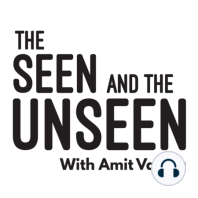28 min listen

Ep 175: The Indian Armed Forces
Ep 175: The Indian Armed Forces
ratings:
Length:
106 minutes
Released:
May 31, 2020
Format:
Podcast episode
Description
As institutions wither around us, the Indian Armed Forces have retained their credibility. But is there a risk of politicization there as well? Lt Gen Prakash Menon joins Amit Varma in episode 175 of The Seen and the Unseen to discuss the evolution of our armed forces through the decades, and the challenges they face today. Also check out: 1. India in the Nuclear Age -- Episode 80 of The Seen and the Unseen (w Lt Gen Prakash Menon). 2. The Strategy Trap -- Lt Gen Prakash Menon. 3. The India-Pakistan Conflict -- Episode 111 of The Seen and the Unseen (w Srinath Raghavan). 4. The Geopolitics of the Bangladesh War -- Episode 113 of The Seen and the Unseen (w Srinath Raghavan). 5. Our Colorful Past -- Episode 127 of The Seen and the Unseen (w Manu Pillai). 6. Army and Nation -- Steven I Wilkinson. 7. Rommel: The Desert Fox -- Desmond Young. 8. To Serve With Honour -- SD Verma. 9. The Battle for Money -- Sushant Singh. 10. The Insurgents -- Fred Kaplan. 11. Counterinsurgency Warfare -- David Galula. 12. The Generation of Rage in Kashmir -- David Devadas. 13. We Won’t Need To Fight A War If We Can Win The Peace -- Amit Varma.
Released:
May 31, 2020
Format:
Podcast episode
Titles in the series (100)
Ep. 10: Digital India: Big Brother is watching you, and you have no protection. There has been much hype about how 'Digital India' will transform our lives, but there are unseen elements to it that should make you worry. Devangshu Datta joins Amit Varma to discuss why it is... by The Seen and the Unseen - hosted by Amit Varma